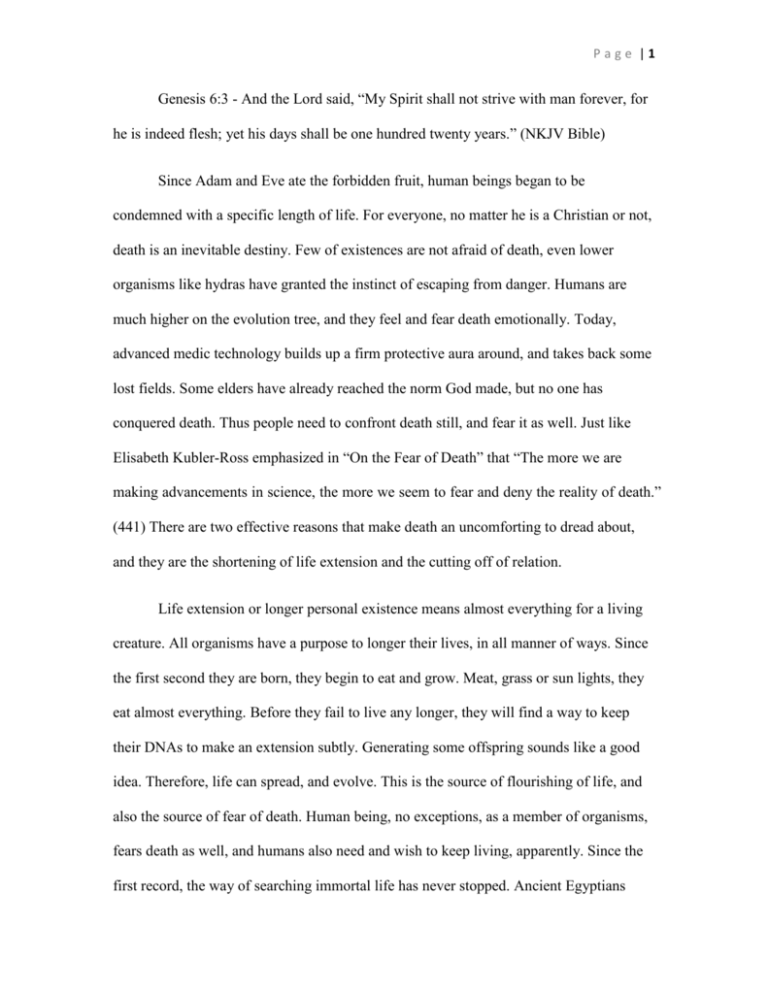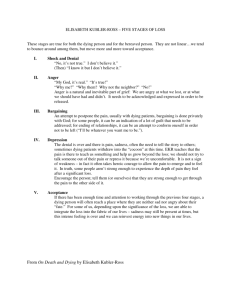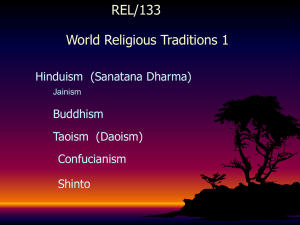Assignment 09
advertisement

Page |1 Genesis 6:3 - And the Lord said, “My Spirit shall not strive with man forever, for he is indeed flesh; yet his days shall be one hundred twenty years.” (NKJV Bible) Since Adam and Eve ate the forbidden fruit, human beings began to be condemned with a specific length of life. For everyone, no matter he is a Christian or not, death is an inevitable destiny. Few of existences are not afraid of death, even lower organisms like hydras have granted the instinct of escaping from danger. Humans are much higher on the evolution tree, and they feel and fear death emotionally. Today, advanced medic technology builds up a firm protective aura around, and takes back some lost fields. Some elders have already reached the norm God made, but no one has conquered death. Thus people need to confront death still, and fear it as well. Just like Elisabeth Kubler-Ross emphasized in “On the Fear of Death” that “The more we are making advancements in science, the more we seem to fear and deny the reality of death.” (441) There are two effective reasons that make death an uncomforting to dread about, and they are the shortening of life extension and the cutting off of relation. Life extension or longer personal existence means almost everything for a living creature. All organisms have a purpose to longer their lives, in all manner of ways. Since the first second they are born, they begin to eat and grow. Meat, grass or sun lights, they eat almost everything. Before they fail to live any longer, they will find a way to keep their DNAs to make an extension subtly. Generating some offspring sounds like a good idea. Therefore, life can spread, and evolve. This is the source of flourishing of life, and also the source of fear of death. Human being, no exceptions, as a member of organisms, fears death as well, and humans also need and wish to keep living, apparently. Since the first record, the way of searching immortal life has never stopped. Ancient Egyptians Page |2 took out the inside and bandaged and dry men into mummies. They believed that their souls would return one day, and when it happened, there must be a body for resurrection in which the spirit to dwell. Moreover, according to Kubler-Ross, they also “supply their dead with food goods to keep them happy,” and the old American Indians “bury their relatives with their belongings.” (439) Likewise, many Chinese emperors were addicted into alchemy; some of them even died from swallowing golden pills. It looks like stupid, but the reason why people got blind to do such things is fear, and this very fear inherited with history. Those are wrong ways to explore the secret of death, but thanks to the fear of death which drives people to move on, they never stop to find better ways. Without such fears, people will not have the motives to invent and develop physical coping strategies, like medic technology and even generating, to extend lives. There are some spiritual ways too. The dread of death and the longing of living will inspire the imagination of human and create some certain kinds of spirits, like ghosts or gods. Those imaginations are kept as tales or religions. In the old age, people could not explain natural phenomenon efficiently with science, so the supernatural ways were very important and useful. People were killed by floods, forest fires etc. every day. The average age of men was about 30 in Neolithic Period (about 6000 B.C.) The fear of no more life or existence is so drastic and significant, so that residents in different areas all have some kind of ghosts. On one hand, ghosts represent the respect and missing of the dead. People yearn to communicate with the lost ones not only because they miss them, but also because they can know that there does have a world after death, and life can exist in some way. On the other hand, they personalize death through ghosts to imagine a very mission impossible, overcoming death, by defeating the ghosts in imaginary. In this case, Page |3 the ghosts as the images of death are the evil spirits that want to hurt people. Even the American Indians whose religion is ancestor and kind of shaman based and do not have an organized like Christians do have specific rituals for the dead. They “shot arrows in the air to drive the spirits away.”(404) Also, Kubler reminds people that “the tradition of the tombstone may originate in the wish to keep the bad spirits deep down in the ground, and the pebbles that many mourners put on the grave are leftover symbols of the same wish.” Many other cultures “have rituals to take care of the “bad” dead person, and they all originate in this feeling of anger which still exists in all of us.”(404) People want to live, to exist, and those ghosts are a more vulnerable target than death itself. In other words, people fear death. Exorcising evil spirits represent to a good wish and try to overcome the fear of death, and it is followed through ages. It is a way to explain death and comfort the feelings of fear. The other product of the fear which can be seen all over the Earth is religion. The feeling of the threat of disappearing flows in humans’ vessels. They fear about death, and they want to extend their lives or at least souls. So it is good to hear that there will be a place for souls to go. Finally, they find “the tree of life” or other similar things maybe. They choose a path that will lead them transcend the end of life. All the different religions among the world are good examples. It is a solution of life; it is a solution of fear. In the past, divinity was as the same as, if not more powerful, science for human to perceive and explain the world. Believing is just like insurance that as long as one keeps it, there will be a place for him to go after he passes away. Observing those religions closely, all the images of different gods come from two sources: the power of nature or the ruler of the society, namely, the fearful existences which master beings’ lives in the Page |4 old days. Gods can punish people on their lives, and people fear them, so they believe that they can avoid the punishments by sacrifices. In her article, Kubler-Ross wrote “maybe this knowledge will help us understand many of the old customs and rituals which have lasted over the centuries and whose purpose is to diminish the anger of the gods or the people as the case maybe, thus decreasing the anticipated punishment.” (439) All the religions provide places for dead people, and no one tells the believers that their souls will disappear or be destroyed forever after death for no reason. Some of them make a promise that they will have a next life or resurrect after a certain time. They make a good use of the fear of losing existences people hold. To some extent, the fear of death is the motive and source of science and culture. People love their lives because they fear to lose them. The other reason why people fear death is more advanced------the break of relations, or it can be called as loneliness. Back to the hydras, one single hydra can live well by itself; maybe it’s better for it because there are no competitions. Plus, a hydra can product itself by budding. However, humans are not hydras. People cannot make a budding reproduce, plus most importantly, they cannot totally live alone either. People are dying all the time. Unfortunately, nowadays, patients have fewer rights to make a choice, and they get lonelier. As an expert on dying state and death, and after doing study for years, Kubler-Ross points out that “one of the most important facts is that dying nowadays is more gruesome in many ways, namely, more lonely, mechanical, and dehumanized.” (440) Those are what people are afraid of. Humans need relatives, and they fear of losing them. No one can learn how to be real man by himself. News about wolf boys, who abandoned by humans and raised up by animals, most famously, wolves, Page |5 are reported on newspapers, and they are hardly to be considered as a part of human group. They act more like wolves, not humans, and it is hard for them to engage with the society again, as a result of being ripped off their old communicative circle, they feel lonely and scared, and most of them die in a young age. Incontestably, there is a kind of people who are called solitaries. But don’t forget where they got the thoughts of living alone and the initial knowledge of how to make a survival as keeping a basic psyche to be a human. Accordingly, people fear isolation. Death is the ultimate loneliness for a being, a completely losing of all the connections with the world. Although religions have made beautiful promises, nobody has ever seen the wonders beyond death. In all the saga stories in folks and holy words in books, the people who have traveled to hell or heaven are all heroes who are the chosen ones or have some relationships with gods, or even more------they are immortal. Since no one knows about death really, they have enough reasons to fear death. Losing the conscience about the world means cutting off all the threads linking with other people. For some person, permanent loneliness is more threatening than the other negative parts death brings like pain and grief. That’s why in prisons, the prisoners are afraid of confinement more than other punishment. Actually, most people will feel very uncomfortable if they are forced to keep all the communicative devices like smart phones and computers for one day. People today can get information from internet without leaving home and talking with others, however internet itself is a splendid thing to communicate with others. So when death hooks up with losing relatives, things begin to screw up, and it gets worse when they finds out that they will die in hospitals and cannot “die in peace and dignity in his own home.” (441) Page |6 Eubler-Ross has witnessed a death when she was a child, and the pathetic farmer has enough time to make after-arrangements. The children are not kept far away from the whole thing. In fact they are “allowed to stay at home where a fatality has struck and are included in the talk, discussions, and fear gives them the feeling that they are not alone in their grief…” (441) So they can learn about death from the relationships they have since childhood, and have a feeling that it is good to be alive. In contrast, today, dying people have “no right to an opinion.” (442) When a dying man lays alone in the emergency room, surrounding by faceless surgeons and nameless instruments, when he find out that all his family members are parted by the dazzling white walls, anxiously waiting outside, and when he recalls his active 14-year-old boy who is in the football team, angle-envies 9year-old daughter, his wife who just got a new job in hospital, his feet diseased old father and chatty mother, his lovely doggy, the friend with whom he quarreled with a few weeks ago, the neighbor who often receive packages for him or even the stranger who smiled to him on the bus, and stuff like those, how could he has the heart to cut all the relatives, leave them all alone and passes to an unknown world forever? By this part, death is the thing to fear indeed. All the people are doomed to face death at the end. No doubt that death is terrible, partly because desire of existence and inheritance, and the fear of losing relative connections and consciences to the world. Maybe human will conquer death one day, but before that far-far-away and not-today day, according to Kubler-Ross, “Death is still a fearful, frightening happening, and the fear of death is a universal fear even if we think we have mastered it on many levels.” (440) Fear of death is quite normal. Although some other feelings can repress the fear of death, people should have fear about death. Who Page |7 doesn’t fear about is either a zealous cult or a total fool. Fearing is feeling, and the fear of death is exact the respect of it, which means the respecting to both the livings and the dead. Kubler-Ross, Elisabeth. “On the Fear of Death.” NKJV Bible




